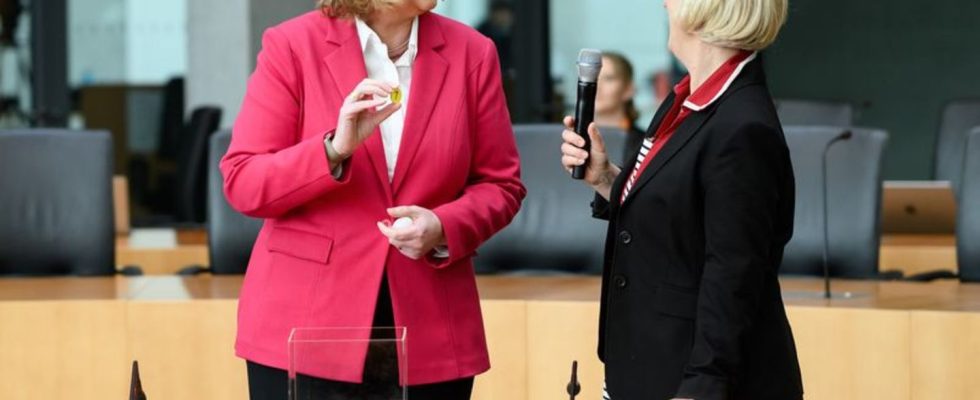advisory body
First citizens’ council on nutrition: the composition has been determined
Bundestag President Bärbel Bas (l, SPD), together with Christine von Blanckenburg from the Nexus Institute, draws the participants of the first citizens’ council ‘Nutrition in Transition’ at the citizens’ lottery in the German Bundestag. photo
© Bernd von Jutrczenka/dpa
The laws are passed by Parliament, and it should stay that way. But now a new advisory body with citizens is ready to start, which should submit recommendations to the people’s representative body.
The composition of the first citizens’ council, which dem Bundestag should make proposals for food policy, is certain. Parliament President Bärbel Bas (SPD) determined the 160 participants in a “citizen lottery”.
The committee is scheduled to start work on September 29 and deal with the topic “Nutrition in transition: Between private affairs and state tasks”. By February 29, 2024, it should present a “citizen’s report” with recommendations. The Bundestag decided to set up the council in May with the votes of the traffic light coalition and the left.
Bas said in Berlin that new approaches should be tried out with citizens’ councils. They created space for encounters of all kinds, in which everyone could contribute personal perspectives and experiences. “This diversity of opinion enriches democracy and, above all, gives those who we always call the ‘silent majority’ a voice.” Citizens’ councils, however, did not replace the parliamentary debate. “In the end, the MPs decide and are responsible for which recommendations are implemented.”
“Balanced participation” is to be achieved
The SPD, Greens and FDP had announced in the coalition agreement that they wanted to use “new forms of civil dialogue” such as citizens’ councils, without giving up the principle of representation. According to the decision to appoint 160 people, who are randomly selected from all people over the age of 16 with their primary residence in Germany, belong to the council. A “balanced participation” according to age, gender, regional origin, town size and educational background should be achieved with certain criteria. The proportion of vegetarians and vegans in the population should also be shown.
According to the Bundestag, the participants were selected using a staged process. In June, almost 20,000 randomly drawn citizens were invited to participate. There were 2200 responses with the desire to participate. From this, an algorithm determined 1000 possible compositions of a citizens’ council according to the criteria determined by the Bundestag. Bas now drew one of these variants of the Citizens’ Council with 160 participants – for this she drew the three digits for the composition of the Council number 187.
26 percent academics represented
According to the organizers, 2.5 percent of the members of the citizens’ council drawn by lot are vegans and 10 percent are vegetarians. When it came to the level of education, more than 70 percent of those interested were initially with a university degree – in the drawn council, academics are now represented with around 26 percent.
In terms of content, the committee should deal with where the state should become active in food policy and where not. Topics include labels for environmental compatibility and animal welfare standards, the tax framework for food and food waste. Three weekend meetings and six digital sessions are planned.
Criticism of the new body came from Union and AfD. Gitta Connemann (CDU) said on ARD: “There is no need for an alibi parliament that is thrown together by lot.” Götz Frömming (AfD) said that Germany has long had citizens’ councils, namely the federal and state parliaments. “We demand the introduction of nationwide referendums instead of this pseudo-democratic simulation of democracy.” On the other hand, Linke parliamentary group manager Jan Korte argued that citizens’ councils could be an instrument “to arouse interest in politics and democracy and to enable participation”. But it shouldn’t be that recommendations are then lost in the coalition’s “traffic light dispute”.

